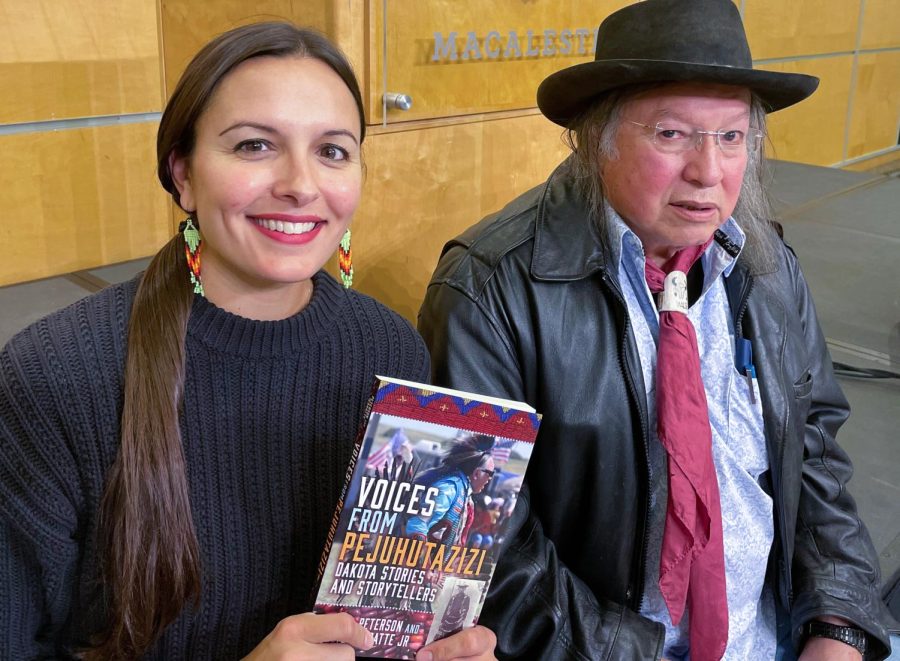Dakota stories and storytelling for Native American Heritage Month
December 1, 2022
On Wednesday, Nov. 16, about 150 people gathered in Kagin Ballroom to hear from authors Walter (Super) LaBatte Jr. ’70 and Theresa Peterson, his niece. LaBatte and Peterson are the authors of Voices from Pejuhutazizi, a collection of stories from five generations of Dakota storytellers.
The event began with a welcome from President Suzanne Rivera, who gave a land acknowledgement and explained that this event was part of a series for Native American Heritage Month.
“[With this event], we’re building on a long legacy of work by students, faculty and staff to make Indigenous peoples, cultures and histories more visible on Mac’s campus,” Rivera said.
Rivera also talked about the Macalester Native and Indigenous Initiative (MNI), with a $1 million grant from the Mellon Foundation which will fund a number of initiatives at Macalester, including hiring four postdoctoral scholars, creating an annual residency for Indigenous experts and developing a series featuring indigenous speakers on campus.
After her opening, Rivera welcomed Katrina Phillips, an associate professor of history at Macalester, to introduce the speakers.
“Stories impart values, they transmit traditions, they deliver heroes, they help us reconcile things that we might not necessarily understand, they entertain, they tell us about certain places and they provide a sense of belonging,” Phillips said.
Phillips then introduced LaBatte and Peterson and shared some more about Voices from Pejuhutazizi.
LaBatte began by speaking about his grandfather, whose written stories inspired the book. He explained that when his grandfather passed away, his family regretted not writing down the stories his grandfather told.
“But unbeknownst to us, he did write those stories down,” LaBatte revealed. “And my aunt inherited that manuscript.”
Many years later, his aunt gave LaBatte the handwritten manuscript and began talking to Peterson about writing and publishing the book that LaBatte’s grandfather had started.
Growing up, LaBatte heard stories from his parents, aunts, uncles and other elders in his community, and he said those stories have lived in his memory for 50 years.
“Deksi [uncle] here is our storyteller and the historian of our family,” Peterson explained.
While LaBatte provided the stories for the book, Peterson further explored the shared themes among them and organized the stories into a book, sorting through pages of handwritten notes from her great-grandfather, her mother and LaBatte.
Peterson said it took over 20 years to write the book, which was a tribute to her great-aunt, LaBatte’s grandmother. Her great-aunt had rewritten the manuscript from LaBatte’s grandfather and passed it on to Peterson.
Peterson also spoke of her great-aunt’s influence on her life.
“[She] introduced me to new ideas like native art; she shared a story of having kept a friend-ship with RC Gorman, the famous Navajo painter, and she supported other artists with purchases of baskets, beadwork and paintings,” Peterson said. “She encouraged me to pursue further education and a career and I imagine that resonated with her own independent life.”
“Eventually, we decided that I would rewrite her book so that others might enjoy her father’s stories,” Peterson finished.
LaBatte then shared some stories from the book, putting his skill as an oral storyteller to work. He told a story about his grandfather first, then one about his father, called Maya Bdeg’a, which translates to Pelican Hill. An ani-mated short film of that story won an Upper Midwest Emmy in 2018.
“I wish [my dad knew],” LaBatte said of winning the award. “He probably would be really proud of the story he told us.”
LaBatte continued telling family stories, including one about his grandmother, who ran for ammunition to help a group of family members escape soldiers during the Dakota War of 1862.
“I think about the journey of my great-great-grandma’s despair, the loss of her homeland, the breakup of her people, my people, and her courage and bravery while fleeing north to Canada,” Peter-son added. “She literally dodged bullets as she ran for ammunition [to help protect her people].”
After the final story was shared, LaBatte and Peterson opened up the discussion for questions from the audience. One audience member asked if LaBatte or Peterson had had a reckoning with their identity or family history at some point in their life. Peterson said that growing up, she’d never heard Dakota stories, or any stories about Indigenous people. She explained that learning about her family history helped her heal.
“I have a new saying: ‘If you know who you are [and] who you belong to, no matter where you go, you belong,’” Peterson said.
LaBatte had a different experience growing up. He always knew he was Dakota, and he took pride in that. While he experienced many obstacles, including racism, he never let people stop him.
“To me, the answer is to stay with your goals,” LaBatte said. “Those obstacles are opportunities, too, to overcome.”
LaBatte ended the presentation by encouraging the audience to ask questions of their parents and elders to ensure that their stories get passed along.
“Listen deeply to others for understanding and sharing and validating these stories in our education systems,” Peterson said. “If we all reclaim our stories, we will begin to eliminate the disparaging narratives that cause in-visibility, harm and alienation.”













